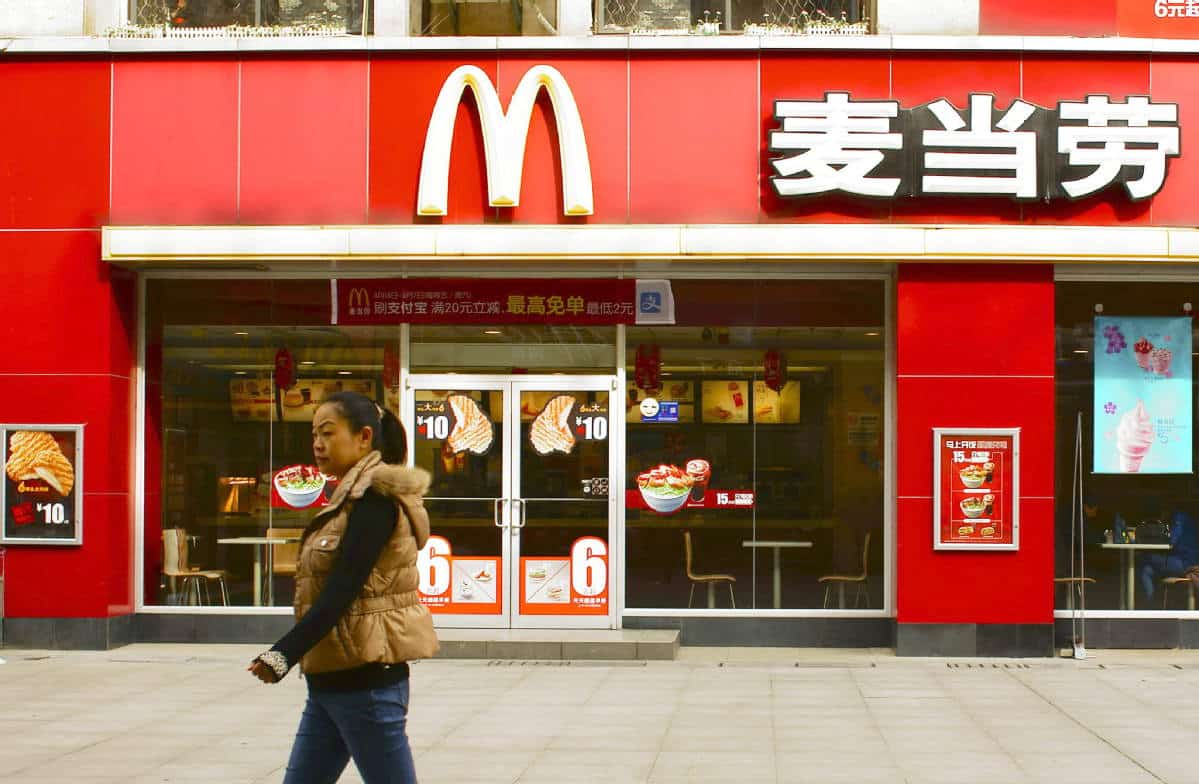I found this article last night after googling “is China imperialist.” It took about ninety minutes to read and I didn’t understand everything. I’ll list the author’s main points if anyone wants to discuss.
According to world systems theory, China occupies a space between the core and the periphery called the “semi-periphery” because it exploits poor countries even though at the same time rich countries like the USA exploit it. I really know nothing about world systems theory except that it kind of seems like “soft Marx”—not so different from Max Weber or Gramsci—a sort of defanged Marxism which western academics can use without threatening their jobs (since it basically allows for the existence of idealistic concepts like “culture” which undermine materialism and act as a kind of logical escape hatch—"capitalism can't be destroyed because of [insert semi-divine idealistic concept here]").
Anyway, I think we all know that the average Chinese person works way harder than the average American, although obviously this varies depending on one’s class. According to this article, China has massively improved the amount of surplus value it’s able to keep inside its own borders but it’s still losing a shitload of labor power to America since America basically pays for Chinese goods by printing money—as a result of China investing a lot of its own surpluses in American treasuries or bonds or whatever to keep the dollar from becoming worthless. At the moment the Chinese are basically keeping the American economy afloat and seemingly working on ways of disconnecting from us—they've been buying up a shitload of gold in order to back their own currency for instance.
The next major point the author makes is that China’s economic growth basically cannot continue. With current technology there just isn’t enough oil, natural gas, or lithium in the world to power the Chinese economy. (Anyone 30 years or older reading this may recall hearing the exact same thing about peak oil in the early 2000s. Shale oil has kicked that can a bit further down the road for the time being.) On top of that, if China managed to raise its standard of living to the American level, the author claims that the amount of surplus labor it would have to extract from the Global South would be intolerable. This is coupled with the fact that we need to be reducing rather than increasing greenhouse gasses at the moment if we’re going to have any hope of saving civilization from climate change.
Regardless of what you think about this prediction, it partly explains China’s Belt and Road Initiative. To continue growing, China has to export capital to the global south—via its massive banks, some of which are among the most profitable companies on Earth—and extract surplus labor. (You may recall that Lenin more or less defines imperialism as monopoly + huge ass banks.) That’s why the Chinese are building dams, ports, and highways all over the place. If China’s economic growth stalls the people are going to throw the CPC’s asses out of power. But even with the BRI, it doesn’t seem like China will be able to maintain its amazing growth rates.
I wasn’t totally convinced by the author that China is exploiting the global south. There are isolated cases of Chinese involvement in things like the DRC’s rare earth metals, but as far as I can tell some of these BRI projects at least (like Sri Lanka’s new port) are actually costing China money and operating at a loss, at least at the moment (we all know what happens to Chinese ghost cities).
I’m also enough of a Dengist to believe that the BRI is a genuine attempt on the part of China to build up the world’s productive forces and that the Chinese are nothing like the Americans or the IMF. The way the BRI seems to work is: Chinese banks loan a country like Ethiopia a shitload of money, Ethiopia asks a Chinese company to build something like a dam with that money, then once the dam is built the Chinese and the Ethiopians basically share the dam, and then sometimes the Chinese cancel the debt. For a deal like this from the IMF, you would have to privatize everything in the Ethiopian economy and use death squads to crush whatever unions they have there. So far as I know China doesn’t pull that shit. One thing they definitely need to work on, however, is increasing their soft power, which Xi has already mentioned.
It seems like, once capitalism builds up the productive forces to a certain point, society basically has a choice. Either you use imperialism to extract surplus labor from the global south (since labor has become too expensive inside your borders), or you abolish the value form. The first option allows you to kind of limp along for awhile like the USA is doing now; the second option has never been tried before as far as I know (except maybe when Stalin got rid of the NEP and collectivized). Basically, in order to make more shit, so-called “developed” countries need to stop focusing on profits. I keep thinking about how in a place like California, migrant laborers work on farms like slaves because it’s cheaper than building machines to do the work instead, due to the expense of building and maintaining these machines and the overall decline in profit in capitalist political economy, although at the same time America throws away a shitload of food and we could probably reduce the amount of farmland and labor we utilize if we just worked better on conserving food (via worker canteens and abolition of restaurants and grocery stores, for instance).
If you go beyond the profit motive, you might be able to basically build a socialist paradise, a Star Trek economy, something pretty much beyond the imaginations of all western economists and most westerners themselves. Once you do that, maybe you can find a way to safely disable America’s nuclear arsenal before it’s too late.
Regardless, it seems like the BRI won’t be enough to rescue China, at least according to this article. But I think there’s a few ways out of this shitty scenario which don’t necessarily require a socialist paradise. In this article (IIRC) the author doesn’t mention the Marxist notion of improving the productive forces—basically finding new ways to increase the surplus you can extract from workers. In the near-future it’s possible that the Chinese will take the lead in technological development and start building the machines they need in order to really pull ahead, whatever those machines may be.
Although fusion technology is always just a few years over the horizon, and although I sound like a technological determinist r*dditor when I say this, it’s possible that fusion energy could save China as well as human civilization if it ever becomes viable. I looked through a few recent science news articles and it seems possible that we could have a few viable fusion reactors within the next few years, but people have been saying that for decades. I also want to mention that I’m not one of those weirdos who believes in nuclear fission energy. You will never get me within a thousand miles of one of those fucking things, at least not by choice. I was only a few hundred miles away from Fukushima when it happened.
Last point: I googled the author and he was basically a lib who was at Tiananmen Square until he got thrown in prison and re-educated himself into a commie. Now he has a swank professorship at the University of Utah (where he must be surrounded by Mormon academics, some of whom occasionally publish scientific articles proving via genetics that the 13th Tribe of Israel really did migrate to America and become the Native Americans) and is publishing interesting though debatable and lengthy articles about world systems theory and critiquing China from the left.
I’m not sure what to think about any of this so whoever wants to school me, please jump in.
Putting this in c/askchapo because it seems more popular than c/chapotraphouse and we don't have a c/economics. Also, nobody respond with with "sir this is a arby's" or :jesse-wtf: or else :owl-pissed:
I would personally consider the average life in a tier 1 Chinese city several steps above life in an equivalent American city. Maybe you don't have the same "quality of life" in terms of owning a car or having a big lawn, but access to public transit and public parks more than make up for those in a far more efficient and sustainable way.
The real question IMO is whether or not that quality of life is possible for everyone in China/the planet, since there's still a huge environmental impact even if the impact per person is much lower. The western world is going to have to densify or die in the coming century no matter what, but it might be literally impossible for already-dense places to accept a reduction in quality of life.
A lot of Americans live in a pointless amount of excess that more efficiency would be liberating. That's the design though. Wastefulness is more profitable than permanently satisfied needs. If we had appliances or transportation or electronics that could last decades, or more efficient urban planning, or better built housing, or really any effort into fixing daily life issues we could reduce consumption and energy usage considerably
I would legitimately rather live in a dense city with affordable food/housing and numerous centralized services that run well, as in China. The US will sell you an electric scooter and a half painted "bike lane" and call it progress. Most home appliances don't need to exist and are copies of other simpler tools (there are some that are handy for disabled people but you have to sift through a lot of junk to find them). And the way we make toys and clothing is appallingly wasteful and unimaginative.
It could be the beginning of a neo-imperialist project, but there is no reason yet to assume that is definitely the case. Calling the BRI imperialist though... Putting it alongside the centuries of colonisation by France, Britain, Germany, and later America... It's not comparable.
Of course the idea is to turn off the faucet of western capital and replace it with the internal production of Chinese industry. A switch will have to be gradual and done with care to ensure that the sectors of industry that have external dependencies have a way to meet those requirements internally within Chinese industry.
I can't pretend to know how the CPC is planning on doing this Indiana-Jones style swap but the necessity for foreign capital makes sense. Socialist construction, while democratic, was not going to provide the new China with the growth in productive capacity it needed to solve the problems of poverty (or at least that's the calculus Deng and Mao and others made around the period of opening up). Hopefully this won't turn out to be a poison pill for China. Unfortunately we have to wait until 2050 to find out :mao-wtf:
I think soft power matters so much here. I’ve lived in two countries whose economies are heavily intertwined with China’s and I’m pretty much the only person I know who thinks that China isn’t an evil dictatorship. Both countries were imperialist though so that must have colored people’s views. I suspect that China is much more popular in the global south.
I feel like Luna Oi doesn’t address China-Vietnam relations at all because China might be more popular among her commie American audience than average Vietnamese people.
CPV is playing both side, just like any smart countries, but it stop right there, they not going to host american artillery or weapon. But the big point is a lot of countries information flow are very much western dominant so the propaganda blitz is quite serious. But the most important that's the govt, as long as it still there, the relationship will be fine. Just hope that after this Ukraine event, many countries start to purge western ngo and media.
It's more popular in the global south but that also has a lot of variation. I know in Central America they largely aren't, save for a couple countries that admire them for their industrial growth more than anything anti-imperialistic.
yooooo it's my man minqi li! i just watched the video form of this essay like last week.
him and most chinese leftists and academics are pretty doomer about china in general, but li really likes doing a sort of hand-wavey big picture sort of thing in the "2.3% average gdp growth at current energy conversion efficiencies will literally boil the planet in 400 years because radiative cooling can't keep up" sense, while other people tend to have more concrete and down to earth examples, at least wrt china.
the global university for sustainability and guan video on youtube has a bunch of video lectures from 温铁军 (wen tiejun) that go into more depth on china's past and present contradictions more deeply if you're interested and can understand chinese. he argues that china's primary issue currently is the struggle against the bureaucratic capitalist class, a group that, while structurally different from its western financial capitalist counterparts, essentially plays the same role of rent extraction and regulatory capture that is strangling (by way of, you guessed it, housing, healthcare, and higher education markets) the chinese proletariat.
i am working on translations of his videos for a western audience, but i need to first finish and upload my gabriel rockhill translations onto bilibili so i can own the fart huffing french theory nerds in china.
complicated, but complicit
pretty sure he's actually more doomer about that than he lets on, but in the interest of keeping everyone's hopium reserves topped off, i'll not speculate. he puts a lot of stock in rural rejuvenation programs as replenishment of reserve labor pools and in their (the village/farm's) inherent stability as a polity and ecological unit, and thinks that's the thing that will keep china going off the deep end in the event of a crisis. iirc that's about as far as he goes in addressing rentier capitalism in china lol. :doomjak:
Sounds interesting but I only know a little Chinese. Is this bureaucratic class similar to the USSR’s NEPmen?
just corrupt local bureaucrats. there was a large decentralization of power over the course of reform and opening up and so municipal governments nowadays are basically their own little fiefdoms with little to no oversight from even the provincial authorities. on top of that, they are incentivized to report higher productivity as they are in competition for funding with all other municipalities within a province (and provinces themselves compete against each other for funding from central). what happens then is that people learn to game the metrics, paper over the cracks and pretend like nothing's wrong until something big and bad enough comes along to blow away the facade (eg: the shitshow in shanghai currently), which is when the central government comes in to clean house and chop heads.
Bri can be imperialist, I’m more curious about dual circulation crap they want to do until 2030. They can simultaneously make coop internal economy, with more capitalist external one. Important word can not will :shrug-outta-hecks:
Moreover pure socialist society with external trade relations can still be imperialist. the world decolonization requires some very focused nation trade policies, like trade comintern or some shit
Gyude Moore: “China in Africa: An African Perspective”
https://www.youtube.com/watch?v=P5uzxV8ub9k
I’m not reading all this, but somebody link the GenZhou effort post on the radlib “dae think China also bad like we are” argument. I have to go get drunk instead.
You’re not wrong for being confused, the shit westerners vomit out about China is a mind-numbing overwritten firehouse of imperial core brainworms, literally regurgitated CIA propaganda, racisim/sinophobia, and :cope: .





